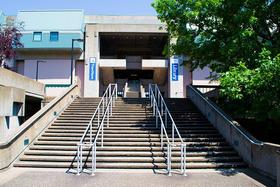Community college has come a long way in recent years, especially with the focus these schools are getting from the current administration. President Obama has labeled these institutions as the hope for American’s economic future and the way this country will remain competitive in a global marketplace. To that end, President Obama has announced a lofty goal of adding 5 million more community college graduates by 2020. He also hosted the first community college summit at the White House last year, which served as the starting point for finding new ways to support these institutions so they are able to meet this ambitious goal.
In this struggling economy, community colleges have become the go-to place for displaced workers looking for training in a new field and high school graduates who are unable to afford the skyrocketing tuition rates at four-year institutions. However, the path from enrollment to graduation is not always an easy one. We have tips to help incoming students get the most from their community college experience, so they can use it as an effective starting point for a successful and lucrative career.
Are You Ready?
The first step toward community college success is proper preparation before the enrollment process even takes place. Whether you are coming to college right out of high school, or have been out of the world of academia for some time, you can determine your college readiness with a relatively simple process.
First, find a readiness assessment online or through your high school guidance counselor. These questionnaires can help you determine the areas where you may need additional support or preparation before you are ready to take community college in stride. Some of the questions that might be on one of these assessments include:
- How were your study habits during high school?
- What courses gave you the most trouble in high school?
- How will you be paying for college?
- What is your most effective method of organization?
Community college readiness can be broken down into three distinct categories: academic, social and financial.
The academic readiness looks at your previous performance in school, your study and organizational habits and whether you have taken the necessary courses to move to the next step.
Social readiness primarily deals with your ability to live away from home, if you are a graduating high school student and plan to take advantage of community college dorms. However, it might also delve into whether you are prepared to balance work, family and school life and if you can adapt to the world of academia after being in the workforce for a number of years.
Finally, it is important to have a plan for how you will pay for school before you enroll. Even though community college is much less expensive than a four-year university, many students end up dropping out before completion because they run out of money for tuition. With a plan in place before you begin college, you will be less likely to have to make that difficult decision.
In this video, a distinguished professor looks at the reasons for student success in community college.
Choosing the Right College for You
Once you have determined that you are ready for community college, the next step is to find the best school for your needs. These are a few factors to consider when selecting the best college for your career and personal goals:
Study Community College Rankings
There are a number of annual rankings that come out on community colleges every year, which provide valuable information about the school’s programs, services and academic success. The CBS report recommends the Community College Survey of Student Engagement, which measures academic excellence at community colleges across the country. Another good source is Washington Monthly, which releases annual rankings of community colleges based on the information provided by the CCSSE and the U.S. Department of Education.
Consider Articulation and Transfer Options
Articulation agreements between community colleges and four-year schools are designed to make transitions from one to the other as seamless as possible. Transfer agreements ensure that credits earned at a two-year institution will be accepted by the four-year school a student enrolls in after community college. These features are very important for students who are making community college a part of their path for a bachelor’s degree or higher.
Look at Programs Offered
Of course, it is important to find a community college that offers a program of study that you are interested in. With many schools and programs to choose from, you should be able to find the program you want at a community college in your area.
Footing the Bill: Options in Financial Aid
Even community college tuition rates can seem steep for some struggling students. It helps to know what your options are in financial aid before you enroll in any institute of higher education. Some of the financial aid options to consider include:
Stafford Loans
Stafford loans are available to part-time community college students who can show a financial need for the funding. Students who are interested in a Stafford loan must complete a Free Application for Federal Student Aid (FAFSA) form. These financial aid products offer flexible interest rates and repayment options to cater to a student’s specific financial needs.
Perkins Loans
Like the Stafford Loan, Perkins Loans are available to students who are enrolled part-time and complete a FAFSA to show financial need. However, Perkins Loans tend to offer more favorable terms and interest rates, making them a more attractive option in financial aid for many students.
Pell Grants
Students who have significant financial need may be eligible for a Pell Grant. This federal grant offers students with a financial need the chance to go to college when they could not otherwise afford it. Assistance is granted according to student need, but maximum amounts are typically set by the federal government each year. These grants do not need to be repaid and are available for both full-time and part-time students in community college.
Scholarships
Many organizations offer some type of scholarship today. With the help of the Internet, you are not restricted to finding scholarship opportunities in your own neighborhood; you can search across the globe instead. Your community college financial aid office or high school guidance counselor may also have resources available to help you find scholarships for which you might qualify.
To ensure you can continue to pay for your community college experience, it is important to complete a FAFSA and apply for financial aid right away. By researching and pursuing all of your financial aid options, you might be surprised at how much assistance is available to help you pay for your higher education.
10 Tips for Academic Success
Of course, once you are enrolled in the community college of your choice, and the tuition bill has been paid, it’s all about the grades. Whether you are coming right from high school or have spent many years in the workforce, many students are simply not prepared for the academic rigors of college. The increased workload accelerated pace and large, impersonal campus can be a very difficult transition for many college students. To help you master all of your college classes, we have 10 important tips for success:
Take Remedial Classes if Necessary
Basics like mathematics and writings may need to be refreshed before you begin taking college-level classes. Some community colleges offer these classes right on campus, but if they don’t, find a high school in your area that can help you get your academics in order before moving to the college level.
Attend Class
This may seem obvious, but studies show a high percentage of community college students end up skipping at least one class within the first three weeks of a new school year. In some cases, your attendance at community college makes up as much as half of your classroom grade! Attend every class, and if there is a day when you know you won’t be there, make arrangements with the professor ahead of time to turn in homework or get new assignments.
Be a Participant
Class participation is essential at the community college level. By getting involved in class discussions, you are able to engage in the material more thoroughly and enjoy the overall classroom experience. Participation also helps you get to know your professors and the other students in the class, two important factors for success that we will touch on again later.
Take Advantage of Resources
Community colleges usually have a wealth of resources designed to help students succeed. Counseling services, tutoring and even health care can offer important benefits that allow students to focus on their studies rather than other concerns. Find out what resources are available at your school as soon as you enroll, whether you talk to a guidance counselor or peruse the college website. That way, you will be able to pursue the resources you need as soon as that need arises.
Get to Know Your Advisor
Every community college has advisors to counsel students on course selection and career paths. However, research suggests that only a small portion of community college students ever pay a visit to the counselor’s office during their entire community college career.
Become a Part of the Community
It can be more challenging to form relationships on a community college campus, since few schools offer dormitory housing. However, since most schools are aware of this challenge, they often provide other methods for students to get together outside of the classroom. Look for opportunities like study groups and mentorship programs that will pair you up with other students for a variety of activities. If your community college does have dormitories, consider living on campus for at least one year of your community college experience to make it easier to fully immerse yourself in the college lifestyle.
This video offers some tips for success in community college.
Plan Your Schedule Accordingly
College workloads increase considerably over high school homework. In addition, many community college students are balancing school with family responsibilities and jobs. It is very important to manage your time wisely at community college to ensure you keep up with your coursework and do not get behind. Complete your assignments daily and review notes from classes regularly, even while setting aside time every week to make a dent in long-term projects before the deadline begins to loom.
Choose Classes Wisely
Most people attend community college with a specific career goal in mind. To ensure you achieve your goal as efficiently as possible, make sure all of the courses you select will take you one step closer to that goal. The best source of assistance for structuring a relevant course schedule is your guidance or career counselor. It is a good idea to meet with this person at the start or end of every semester to ensure your next course load meets your ultimate end.
Talk to Professors
Community college professors and their assistants offer extended office hours to see students outside the classroom. This is the perfect opportunity to get extra help on assignments or more clarity on how to structure a paper or project. If you are struggling in a class, your professor is the first person to talk to about extra resources or possible tutoring. Professors can also provide guidance in course selection to help you hone your career path.
Stay Focused on Long-Term Goals
Even though community college is a shorter term than a four-year university, it can be challenging to persevere until graduation day. When the going gets tougher, it helps to remember that you are in the world of academia for a purpose – whether that purpose is to pursue a career or additional education afterward. Like any long-term goal, keeping the end in sight is an important part of sticking with the process until the end. This is especially true when it comes to completing college of any kind.
Community college can be a wonderful way to jumpstart a new career or continue on the path of higher education after high school. With the increased demand for and focus on community colleges today, the list of programs and resources are expanding at campuses across the country. If you decide that community college is the right next step for you, it is important to prepare for the experience to increase your odds of success. With these tips in mind, your years spent at community college can set you on the path for a rewarding career.
Questions? Contact us on Facebook. @communitycollegereview











